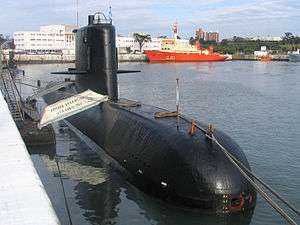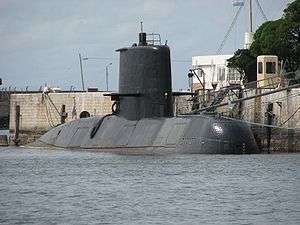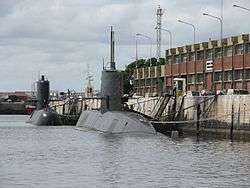TR-1700-class submarine
 TR-1700 submarine ARA Santa Cruz (S-41) at Base Naval Mar del Plata. | |
| Class overview | |
|---|---|
| Builders: | Thyssen Nordseewerke, Emden, Germany |
| Operators: |
|
| In commission: | 1984-present |
| Planned: | 6 |
| Completed: | 2 |
| Cancelled: | 2 |
| Active: | 2 |
| Laid up: | 2 |
| General characteristics | |
| Type: | Submarine |
| Displacement: |
|
| Length: | 66 m (216 ft 6 in) |
| Beam: | 7.3 m (23 ft 11 in) |
| Draught: | 6.5 m (21 ft 4 in) (21.32 feet) |
| Propulsion: |
|
| Speed: |
|
| Range: | 12,000 nmi (22,000 km; 14,000 mi) at 8 kn (15 km/h; 9.2 mph) surfaced |
| Endurance: | 30 days |
| Test depth: | 300 m (980 ft) |
| Complement: | 26 |
| Sensors and processing systems: |
|
| Armament: |
|
The TR-1700 (Santa Cruz) is a class of diesel-electric patrol submarines built by Thyssen Nordseewerke for the Argentine Navy in the 1980s. These ships are amongst the largest submarines built in Germany since World War II and are among the fastest diesel-electric submarines in the world.[1]
Development
The original 1977 plan called for six boats, two TR-1700’s built in Germany by Thyssen Nordseewerke, two in Argentina by Astillero Domecq Garcia, and two smaller TR-1400’s also built in Argentina.[2] The final agreement in 1982 was modified to six TR 1700’s.
Design
The submarine was designed by Thyssen and its features include high underwater speed, endurance(for a diesel submarine), and survivability. The boat's four MTU diesel engines, four generators, and Siemens electric motor can propel it at speeds up to 25 knots (46 km/h; 29 mph).[3] Eight 120-cell batteries are installed on each boat. They have a diving depth of 300 m (980 ft). Normal endurance of these boats is 30 days with an extended range up to 70 days. These boats are equipped to accept a Deep Submergence Rescue Vehicle (DSRV). Armaments include six bow 533 mm (21 in) torpedo tubes and 22 SST (Special Surface Target) or Mark 37 torpedo. The automatic torpedo reload system can reload the tubes in 50 seconds.[2]
Thyssen proposed the TR1700A for the Australian Collins-class submarine program.[4] The proposed design had a reworked pressure hull, was six meters longer, and half a meter wider than the TR1700s built for Argentina. It lost to the Type 471 from Kockums, an enlarged Västergötland-class submarine.
Service
The first two submarines were delivered on schedule in 1984-85. The remaining four built in Argentina were suspended due to the Argentinean economic crisis of the 1980s. In 1996 work completely ceased on ARA Santa Fe at 70 percent (or 52 percent) completion while ARA Santiago del Estero was only 30 percent complete.[5] After attempts to complete and sell the boats to other countries (Taiwan) failed they were cannibalized, along with the parts for the fifth and sixth units, to support the continued operations of the first two submarines.[1]
Santa Cruz received its mid-life modernization at Arsenal de Marinha, Rio de Janeiro Brazil between September 1999 and 2001.[2] The work involved the replacement of the engines, batteries, and sonar. Her sister boat San Juan entered the Astillero Domecq Garcia shipyard to receive her refit in 2007 and will receive similar work.[6] San Juan completed refit in 2013. [7]
In September 2010 it was revealed that the Ministry of Defense is conducting feasibility studies to decide if ARA Santa Fe (S-43) should be completed. The decision should be made sometime after completing the mid-life modernization of ARA San Juan (S-42). The estimated cost of completing Santa Fe is $60 million.[8][9]
Boats in class
| Ship | Pennant number | Builder | Completed | Status |
|---|---|---|---|---|
| ARA Santa Cruz | S-41 | Thyssen Nordseewerke | 18 October 1984 | In service with Argentine Navy |
| ARA San Juan | S-42 | Thyssen Nordseewerke | 19 November 1985 | In service with Argentine Navy |
| ARA Santa Fe | S-43 | Astillero Domecq Garcia | Construction suspended - 70% (or 52%) complete[10] Boat could be completed after feasibility studies | |
| ARA Santiago Del Estero | S-44 | Astillero Domecq Garcia | Construction suspended - 30% complete | |
| (none) | S-45 | Astillero Domecq Garcia | Construction suspended - Little complete[5] Components cannibalized for spares | |
| (none) | S-46 | Astillero Domecq Garcia | Suspended Components cannibalized for spares[5] |
Gallery
 Argentine Navy ARA San Juan in 2007
Argentine Navy ARA San Juan in 2007 Argentine Navy TR-1700 Submarines ARA Santa Cruz (S-41) and ARA San Juan (S-42).
Argentine Navy TR-1700 Submarines ARA Santa Cruz (S-41) and ARA San Juan (S-42).
See also
References
Notes
- 1 2 Miller, David (2002). The Illustrated Directory of Submarines. Zenith Press. p. 480. ISBN 0-7603-1345-8.
- 1 2 3 Santa Cruz class Patrol submarine
- ↑ Watts, Anthony (March 2002). Jane's Underwater Warfare Systems, 2002-2003. Jane's Information Group. p. 629. ISBN 0-7106-2451-4.
- ↑ Woolner, Derek (18 September 2001). Procuring Change: How Kockums was Selected for the Collins Class Submarine. Canberra: Department of the Parliamentary Library. p. 34.
- ↑ The hull of the S-42 ARA San Juan again soldier
- ↑ El arte de reparar submarinos - Pagina 12, 3 August 2014 (2016-05-01)
- ↑ Por primera vez en la historia se construirán en nuestro país submarinos para la Armada
- ↑ <"Argentina estudia construir submarino nuclear en astilleros propios" - FuerzasAeronavales website - article by Sergio Garcia Pedroche, 28/09/2010 (accessed 2016-07-16)
- ↑ Congreso Nacional: del submarino ARA Santa Fe, el cual se encuentra al 70% de su construcción
Bibliography
- Conway's All the World's Fighting Ships 1947-1995
Further reading
- Amendolara Bourdette, Ignacio (2005). Guia de los buques de la Armada Argentina 2005-2006 (in Spanish and English). Buenos Aires, Argentina. ISBN 987-43-9400-5. Retrieved 2014-09-13.
- Sergio Garcia Pedroche (2010-07-23). "Retomarían Proyecto de Submarino de Propulsión Nuclear". FuerzasAeronavales.com (in Spanish). Fuerzas Aeronavales. Retrieved 16 July 2016.
External links
- Santa Cruz-class patrol submarine
- Submarino de ataque (SSK) classe Santa Cruz / TR-1700
- Classe TR-1700
